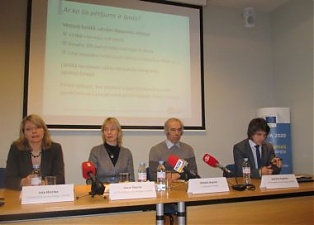Analytics, Education and Science, EU – Baltic States, Latvia, Markets and Companies, Society
International Internet Magazine. Baltic States news & analytics
Friday, 19.04.2024, 01:04
30% Latvian emigrants not planning to come back
 Print version
Print version |
|---|
| BC's photo. |
Inta Mierina, a researcher at the Institute of Philosophy and Sociology of the University of Latvia, said that 4% of Latvians residing abroad are planning to return within six months, 12% – in a period of five years, 14% said they would come back after retirement, and 40% said they could come back if the circumstances were right.
The results of the survey prove that Latvian emigrants have not perished the thought of returning to Latvia, commented Mierina. "The situation could change if people were able to earn enough to support their families. This is when more compatriots could return than the current number of those planning to do so," she said.
Over the past decade, about 220,000 residents of Latvia emigrated to other countries, and at the moment more than 10% of Latvians live abroad. "The pace of emigration has been slowing down in the last several years, but the number nevertheless continues to increase. We have observed that the proportion of young people has been increasing in the total number of emigrants, and there are entire families that emigrate from Latvia."
"However, the largest part of the Latvian diaspora still consider themselves part of Latvia. They have not been lost for Latvia. Nevertheless, their children become assimilated and gradually lose their knowledge of Latvian," said Mierina. Her colleague Inese Supule agrees: although 70% of Latvians living abroad want their children to have a good command of Latvian, and 21% want their children to at least know how to speak Latvian, their children tend to assimilate into the local culture. The state could provide more support for strengthening Latvian identity and language courses, believe the researchers.
Supule added that Latvian emigrants continue to maintain close ties with Latvia. 63% – 71% of Latvians and 49% of non-Latvian residents of Latvia – say that they have close ties with Latvia. 67% regularly follow the developments in Latvia, 91% have friends in Latvia, 71% meet with their friends and relatives who live in Latvia, 63% celebrate "Ligo!" holiday, 62% continue to listen to Latvian music.
However, the Latvian diaspora's opinion of and trust in the Latvian government are disastrous – 56% of respondents said that they would give the government a mark of zero on a ten-point scale, and the average mark is 1.5. "These people believe that the Latvian government has no interest in them," said Mierina.
Mihails Hazans, professor at the University of Latvia's Faculty of Economy and Management, said that emigrants from Latvia were happier with their lives, finances, job and home.
"Furthermore, most emigrants from Latvia are happier with their lives as compared to local residents in a given country," said the professor.
Three-quarters of those who left Latvia from 2000 to 2014 are satisfied with the way they live, and less than 10% are not. "Our emigrants are capable of developing normal relations with the other people" in their communities, said Hazans.
Both Hazans and Mierina note that emigration and the Latvian diaspora abroad should not be considered a problem but an opportunity for the development of closer social, economic and cultural contacts.
"One of the most surprising findings of the study was that 25% of Latvian emigrants are planning to establish a company in Latvia sometime in their future, or are considering a partnership with residents of Latvia," said Hazans, adding that this would contribute to the economic development of Latvia.








 «The Baltic Course» Is Sold and Stays in Business!
«The Baltic Course» Is Sold and Stays in Business!

